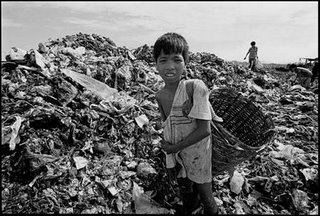Right at the beginning of the film Romero is talking with his friend Father Rotullio and Romero, troubled by what he overhears in the marketplace, cautions his friend about fostering subversive ideas. The response was profound: How can I love God whom I cannot see if I cannot love my neighbour whom I can see.

Romero's conversion is slow and painful, full of wrestlings. It is, in other words, very real. There are many uncomfortable moments. But to see this "man of books" find courage within himself to recover the violated host from the occupied church really moved me. I often wonder what I would do if faced with a similar circumstance - would I risk my life for the gospel? Romero encourages me that in that moment there is a strength that cannot be gained from books, and that strength is sufficient.
Finally listening to the radio this morning they were talking about global climate change. The concensus is that 90% of scientists agree that the climate is changing and that we are responsible. Driving home last night a fellow preacher had the oddacity to suggest that if the climate is changing that's just God's will, fatalism like that drives me nuts. Even though I felt the speakers on CBC held too much faith in a technological solution they were calling for a social transformation. Romero says that economics is the root cause of the injustice in his country. That critique is common to Liberation Theology and is apt. In fact all of the world is implicated in this injustice. This must be part of the social transformation, a conscientization, if we are to see justice not just ecologically but socially and politically as well. We can't afford to throw up our arms in the face of crisis, and we can't afford to ignore the fact that our economic choices have global repercussions. We need to find a better way.
4 comments:
I agree! I saw Romero and loved it also. What sets people like Romero apart is he's not willing to consign everything to a fatalistic idea of God's will, but somehow marries what God does with humanity. His courage to ACT is exactly what we need today!
That is a characteristic of Liberation Theology. If you haven't touched on that at all I would highly recommend "We Drink from our own Wells" by Gustavo Gutierrez. The Boff brother's Introduction to Liberation Theology is also excellent, but Gustavo has a profound way of articulating a spirituality much in need in our day.
Eh, fatalism - what can you do about it?
;-)
Preach it, brother.
I agree! Climate becomes more and more unpredictable lately. Economic progress is the main reason for exploitation and oppression of the poor. I see it all around me. I also want to see Romero. Thanks for the tip.
Post a Comment